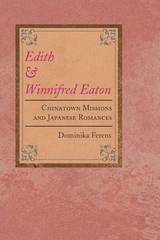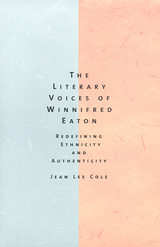
Arguing that Edith as much as Winnifred constructed her persona along with her pen name, Ferens considers the fiction of both Eaton sisters as ethnography. Edith and Winnifred Eaton suggests that both authors wrote through the filter of contemporary ethnographic discourse on the Far East and also wrote for readers hungry for "authentic" insight into the morals, manners, and mentality of an exotic other.
Ferens traces two distinct discursive traditions–-missionary and travel writing–-that shaped the meanings of "China" and "Japan" in the nineteenth century. She shows how these traditions intersected with the unconventional literary careers of the Eaton sisters, informing the sober, moralistic tone of Edith's stories as well as Winnifred's exotic narrative style, plots, settings, and characterizations.
Bringing to the Eatons' writings a contemporary understanding of the racial and textual politics of ethnographic writing, this important account shows how these two very different writers claimed ethnographic authority, how they used that authority to explore ideas of difference, race, class and gender, and how their depictions of nonwhites worked to disrupt the process of whites' self-definition.

Born in the Australian bush, Stella Miles Franklin became an international publishing sensation in 1901, at the age of 21, with My Brilliant Career, whose portrayal of an ambitious and independent woman defying social expectations still captivates readers. In a magisterial biography, Jill Roe details Miles’ extraordinary life.
Early success launched Miles into influential literary and socialist circles in Sydney and Melbourne, where she met Banjo Paterson (composer of “Waltzing Matilda” and author of The Man from Snowy River) and suffragist Vida Goldstein (who introduced her to Christian Science). Researching the lives of working women, Miles disguised herself as a domestic for a year. She then lit out for adventure abroad, landing in San Francisco just after the Great Earthquake. At Jane Addams’ Hull House in Chicago, she joined the women’s labor movement, working for the National Women’s Trade Union League and writing for its magazine.
Moving to Britain in 1915, Miles joined the war cause and served in Macedonia as a hospital orderly and then worked in London for various feminist and progressive causes, including the National Housing Council. Always she wrote, becoming a prolific author of plays as well as novels and archetypal bush stories. Returning to Australia in the 1930s, she supported women’s causes and promoted Australian writers, leaving her estate to endow the nation’s premier literary award.
The culmination of decades of research in thousands of papers left by Miles, Her Brilliant Career stands as the definitive life of this remarkable writer and feminist.

Eaton attempted to disguise her Chinese heritage by writing under a hypothetically Japanese pen name. In legal documents, she usually claimed a "white" racial identity. In her fiction, Eaton portrayed Japanese, Chinese, Irish, and American characters, relying on the accepted stereotypes of the day. Jean Lee Cole shows that the many voices Eaton adopted show her deep preoccupations with "American" identity as a whole. The author attempts to reconcile all of these "voices," examining how Eaton survived in a climate hostile to minority writers in the early twentieth century, and how her seemingly anomalous works conjoin Asian American and American literary history.
READERS
Browse our collection.
PUBLISHERS
See BiblioVault's publisher services.
STUDENT SERVICES
Files for college accessibility offices.
UChicago Accessibility Resources
home | accessibility | search | about | contact us
BiblioVault ® 2001 - 2024
The University of Chicago Press









